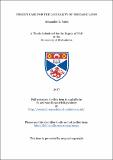Files in this item
Frege's case for the logicality of his basic laws
Item metadata
| dc.contributor.advisor | Milne, Peter | |
| dc.contributor.advisor | Sullivan, Peter M. | |
| dc.contributor.author | Yates, Alexander | |
| dc.coverage.spatial | 118 p. | en_US |
| dc.date.accessioned | 2017-12-05T12:04:06Z | |
| dc.date.available | 2017-12-05T12:04:06Z | |
| dc.date.issued | 2017-06-22 | |
| dc.identifier.uri | https://hdl.handle.net/10023/12252 | |
| dc.description.abstract | Frege wanted to show that arithmetical truths are logical by proving them from purely logical basic laws. But how do we know that these basic laws are logical? Frege uses generality and undeniability to make a prima facie case for logicality—if a truth is general and undeniable, then it’s likely logical. I argue that Frege could, did, and had to make a deeper case for why we’re right in recognizing his basic laws as logical. Implicit in his work is a view of logical laws as epistemically analytic—his arguments for his basic laws serve to elicit a reflective awareness of the fact that understanding them is sufficient for recognizing them to be true. This view both fits with Frege’s comments concerning the connection between logic, truth, and normativity, and serves to explain why and in what sense he took logic to be general and conceptually undeniable. In my view, semantics must play a distinctive role in any rational reconstruction of Frege’s case for logicality—the aforementioned “reflective awareness” must be an explicit appreciation of how the truth of formulas expressing Frege’s laws follows quickly from his stipulations governing terms which figure in those formulas. Opposing this view is the elucidatory interpretation of Thomas Ricketts, Warren Goldfarb, and Joan Weiner, which holds that Frege’s arguments for his basic laws can’t be taken at face value, and must serve the merely elucidatory purpose of easing us into the language. Another reading is the correctness interpretation of Richard Heck and Jason Stanley, which holds that Frege’s primary purpose in his arguments is justifying the claim that Frege’s axioms, qua formulas, are true. I argue against both of these interpretations, and in doing so clarify the role and limits of semantics in Frege’s enterprise. | en_US |
| dc.language.iso | en | en_US |
| dc.publisher | University of St Andrews | |
| dc.subject | Frege | en_US |
| dc.subject | Logic | en_US |
| dc.subject | Epistemic analyticity | en_US |
| dc.subject | Philosophy of logic | en_US |
| dc.subject | History of analytic philosophy | en_US |
| dc.subject | Basic laws | en_US |
| dc.subject | Grundgesetze | en_US |
| dc.subject.lcc | B3245.F24Y2 | |
| dc.subject.lcsh | Frege, Gottlob, 1848-1925--Contributions in logic | en |
| dc.subject.lcsh | Arithmetic--Philosophy | en |
| dc.title | Frege's case for the logicality of his basic laws | en_US |
| dc.type | Thesis | en_US |
| dc.contributor.sponsor | Royal Institute of Philosophy | en_US |
| dc.type.qualificationlevel | Doctoral | en_US |
| dc.type.qualificationname | PhD Doctor of Philosophy | en_US |
| dc.publisher.institution | The University of St Andrews | en_US |
| dc.publisher.department | University of Stirling | en_US |
This item appears in the following Collection(s)
Items in the St Andrews Research Repository are protected by copyright, with all rights reserved, unless otherwise indicated.

